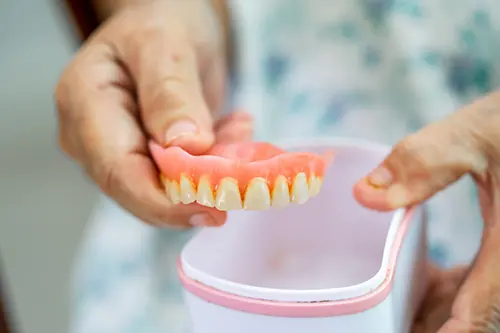Reviewed by Dr. Kerri Font, DDS
Reading time: three minutes.

Dry mouth can frustrate many denture wearers, making speech difficult and threatening oral health. Your saliva flow keeps oral tissues healthy and defends against tooth decay, fungal infection, and gum disease. When a dental appliance disrupts saliva production, discomfort quickly follows.
In this blog, you will learn how dentures can affect saliva flow, why dry mouth occurs, and the practical at‑home and professional solutions that protect your oral health and comfort.
Table of Contents
- Why Saliva Is Important
- Quick Home Remedies
- Professional Care for Denture-Related Dry Mouth
- Schedule Your Consultation Today
Key Takeaway
Dry mouth with dentures is often caused by poor fit, adhesive overuse, or medical conditions. Addressing the root cause can improve comfort and oral health.
Now Serving Two Locations
Highlands Ranch Periodontics & Dental Implants is proud to serve patients at both our established Highlands Ranch office and our new location in Sloan’s Lake, Denver. Same trusted care—now in two convenient locations.
Why Saliva Is Important
Healthy salivary gland function keeps enamel strong, protects soft tissues, and allows you to taste food. Adequate saliva production washes away bacteria, prevents tooth decay and fungal infection, and stops oral stomatitis (inflammation) from developing.
How Dentures Change Saliva Flow
Dentures sit on the soft tissues and bony ridges of your mouth, which play a role in stimulating saliva production. When a denture fits poorly or relies too heavily on adhesives, it can interfere with this stimulation, reduce saliva flow, and lead to a dry, uncomfortable mouth.
- Poor denture fit: Loose dentures shift against the gums and press on salivary glands, reducing natural saliva flow.
- Excess adhesive use: Thick layers of denture adhesive can block gland ducts and interfere with both natural saliva and artificial saliva substitutes.
- Coverage of the palate: Denture bases that fully cover the roof of the mouth reduce stimulation, which can slow saliva production.
- Plaque buildup: Inadequate cleaning allows plaque and calculus to accumulate on the denture, which can trap bacteria and reduce moisture.
- Mouth breathing: A poorly fitting denture may encourage open-mouth posture, which dries tissues faster than saliva can replenish them.
- Medication side effects: Many common prescriptions—especially those for blood pressure, allergies, or depression—list dry mouth as a side effect, compounding the issue for denture wearers.
Systemic Reasons for Dry Mouth
Autoimmune diseases, diabetes, chemotherapy, and other systemic diseases can damage salivary glands before a denture ever touches your gums. Periodontal disease or mouth infections may further block ducts and cut saliva flow. A new denture can aggravate dryness, but the underlying illness often drives the problem.
Symptoms You Should Not Ignore
Persistent dry mouth can lead to irritation, infection, and difficulty wearing your denture comfortably. Watch for these common signs that dryness is affecting your oral health:
- Thick, stringy saliva
- Burning tongue or palate
- Cracked lips and mouth corners
- Altered taste
- Frequent sores under the denture base
Quick Home Remedies
Simple daily habits can support saliva production and keep your denture more comfortable to wear:
- Sip water frequently: Small, regular sips help keep oral tissues moist and rinse away debris.
- Chew sugar-free gum or use xylitol lozenges: Gentle chewing or sucking stimulates salivary glands and helps prevent decay.
- Use over-the-counter saliva substitutes or oral gels: These products coat the mouth and provide temporary relief from dryness.
- Run a humidifier at night: Adding moisture to the air while you sleep can ease nighttime dryness.
- Maintain thorough denture hygiene: Brush your denture daily, use a gentle cleanser, and soak it overnight in an approved solution.
- Avoid caffeine and alcohol: Both can contribute to dehydration and reduce saliva flow.
Professional Care for Denture-Related Dry Mouth
If home remedies do not provide relief, our periodontists offer targeted solutions to restore comfort and support healthy saliva flow:
- Denture relines or replacements: A well-fitted denture improves stability and reduces pressure on salivary glands.
- Implant-supported dentures: Dental implants secure the denture in place, reduce the need for adhesives, and allow more of the palate to stay uncovered which stimulates natural saliva flow.
- Prescription saliva substitutes or oral gels: Medical-grade products can coat tissues, ease discomfort, and lower the risk of oral infections. We provide guidance on safe and effective use.
- Medication review and coordination: If dry mouth is medication-related, we work with your physician to explore alternatives that may reduce symptoms.
Schedule Your Consultation Today
Dry mouth with dentures can lead to irritation, infections, and difficulty eating or speaking. If you are noticing signs of dryness, discomfort, or a poor fit, we can help. Our periodontists offer practical, long-term solutions to improve denture comfort and protect your oral health.
To book an appointment at our periodontal clinic in Highlands Ranch, CO, call (303) 683-1144 or visit us at 9090 S Ridgeline Blvd. #225, Highlands Ranch, CO 80129.
To book an appointment at our periodontal office in Sloan’s Lake, call (303) 683-1144 or visit us at 1525 North Raleigh Street Suite 130 Denver, CO 80204.
